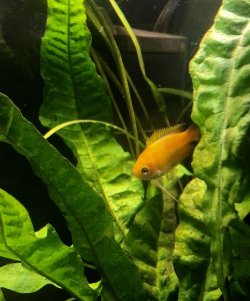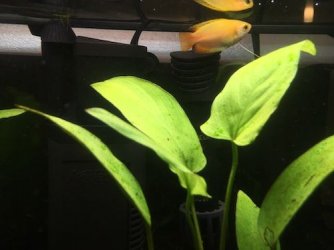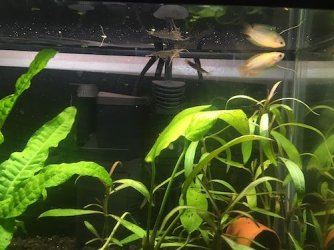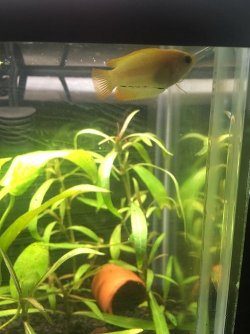RedSarah
Fish Fanatic
Hello folks! I'm getting worried about my honey gourami buddy, Cheese... I have had him for just over a year and noticed that his color has been fading slowly over the past month. He is in a moderately planted 5.5 gallon (will be upgrading in the next few months after I move). I struggled with green hair algae for a while and introduced three Amano shrimp and three nerite snails in February. I also introduced some new plants about three weeks ago.
What is really starting to worry me is Cheese's poop. At times, it is clear and stringy intermixed with brown, normal looking poop. His poo has been stringy before, but it was clearly because he was eating the hair algae. He is still active and a pretty ravenous eater, but is looking skinny. I am feeding him New Life Spectrum Thera A pellets once a day, along with blanched veggies (for snails, as well).
Water Parameters:
Ammonia: 0
Nitrite: 0
Nitrate: 20-40 (not sure if this could be stressing him?)
PH: 7.6
I do 50% water changes with Prime and gravel vacs once a week. The filter is an Aqueon Quietflow 10 which I clean every other week. Here are some photos of his color changes and stringy poop. Thank you so much!!
May 1st, 2018:

February 7th, 2019:

March 28th, 2019 (today):

Stringy Poop (today):

What is really starting to worry me is Cheese's poop. At times, it is clear and stringy intermixed with brown, normal looking poop. His poo has been stringy before, but it was clearly because he was eating the hair algae. He is still active and a pretty ravenous eater, but is looking skinny. I am feeding him New Life Spectrum Thera A pellets once a day, along with blanched veggies (for snails, as well).
Water Parameters:
Ammonia: 0
Nitrite: 0
Nitrate: 20-40 (not sure if this could be stressing him?)
PH: 7.6
I do 50% water changes with Prime and gravel vacs once a week. The filter is an Aqueon Quietflow 10 which I clean every other week. Here are some photos of his color changes and stringy poop. Thank you so much!!
May 1st, 2018:

February 7th, 2019:

March 28th, 2019 (today):

Stringy Poop (today):

Last edited:


